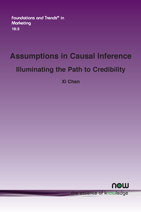Assumptions in Causal Inference: Illuminating the Path to Credibility
By Xi Chen, Erasmus University Rotterdam, The Netherlands, chen@rsm.nl
Abstract
This monograph offers a practical roadmap to credibility in the rapidly growing field of causal inference in marketing. It argues that credible causal claims do not arise from data alone, but from a critical identification step pairing data with assumptions. The strength of any conclusion rises or falls with the credibility of the assumptions. To that end, the monograph proposes a novel framework for working with assumptions: present them clearly, test them rigorously, and relax them when realism demands. It further distils the three core identification strategies, conditioning, identification by mechanism, and instrumental variables, and shows how common approaches such as difference-in-differences fit within these strategies, guided by insights from the philosophy of science. It also demonstrates how to design and interpret sensitivity analyses and consistency (placebo) tests as principled plausibility reasoning that stress tests assumptions rather than simply asserting them. Finally, it offers a practical workflow for applying causal inference methods to enhance credibility. In general, it provides a coherent and actionable path from assumptions to credible causal knowledge in marketing and beyond.
Assumptions in Causal Inference: Illuminating the Path to Credibility
Assumptions in Causal Inference adopts a first-principles approach to examining assumptions in causal inference, breaking down complex problems into fundamental building blocks. The structure of this monograph follows a logical progression from the establishment of foundational concepts to the application of them in practice.
